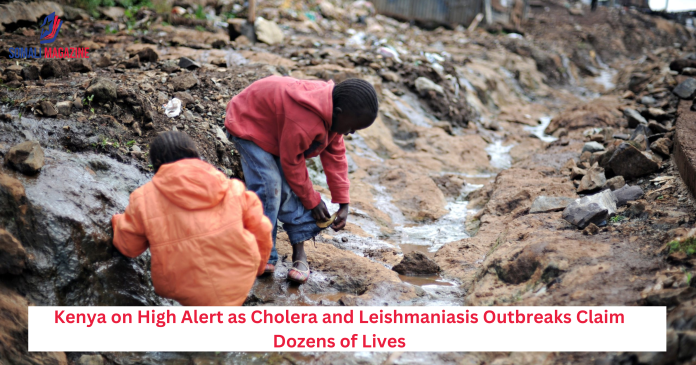Facebook Twitter (X) Instagram Somali Magazine - People's Magazine
Government urges public to stay vigilant and practice hygiene as waterborne and insect-borne diseases spread across multiple counties
The Kenyan government has called on all citizens to be on high alert following a cholera outbreak that has already claimed several lives. According to health officials, at least five people have died from the disease, and the number of cases continues to rise.
Cholera is a serious illness that affects the stomach and intestines. It spreads mainly through contaminated food and water, and it can cause severe diarrhea, vomiting, and dehydration. The disease can be especially dangerous for young children and people with weak immune systems.
Mary Muthoni, a senior health official, made a public statement on Wednesday, urging Kenyans to take extra care of their surroundings and hygiene. “The government is asking you to be extremely vigilant of your surroundings to deal with a cholera outbreak that has now claimed over five lives countrywide,” she said.
The outbreak comes after heavy flooding affected many parts of the country last year. The floods may have contaminated water sources, creating the perfect environment for cholera to spread. Dirty water and poor sanitation are common causes of such outbreaks.
So far, cholera cases have been reported in at least three counties: Migori, Kisumu, and Nairobi. On Tuesday, the Ministry of Health released figures showing that there had been 97 reported cases of cholera, with six deaths linked to the disease. The numbers may continue to grow if quick action is not taken to control the spread.
Cholera isn’t just affecting Kenya. Other countries in East Africa are also dealing with outbreaks. South Sudan, in particular, is facing a much larger crisis. According to the United Nations, nearly 700 people died from cholera in South Sudan just last month. These high numbers show how dangerous and fast-spreading the disease can be, especially in places with limited access to clean water and proper healthcare.
In addition to cholera, Kenya is also battling another health crisis—leishmaniasis. This disease, though less well-known, is also very serious. So far, over 1,000 people in Kenya have been infected, and 33 people have died.
Leishmaniasis is caused by tiny parasites that are spread through the bites of sandflies. There are different types of leishmaniasis, but all of them can cause serious health problems. The most common form causes painful skin ulcers and long-lasting scars. In more severe cases, the disease can attack internal organs such as the liver and spleen, which can be deadly if not treated.
Mary Muthoni explained that leishmaniasis is often found in areas with poor sanitation and poverty. Dirty and crowded living conditions make it easier for the sandflies to breed and spread the disease. She said that the health ministry is doing everything it can to manage the outbreaks but warned that public cooperation is vital.
To prevent further spread of both diseases, health officials are encouraging Kenyans to boil their drinking water, wash their hands regularly, and make sure their food is cooked properly. People are also advised to keep their homes and surroundings clean to avoid attracting insects that may carry diseases.
The government is working with health organizations and local authorities to respond quickly to the outbreaks. They are setting up treatment centers, educating the public, and distributing clean water and sanitation supplies.
Kenyans are being reminded that simple steps like handwashing, keeping food covered, and using clean toilets can save lives. With community support and fast action, officials hope to bring both outbreaks under control and prevent more deaths.

